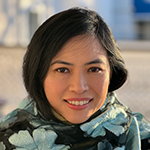The Wake
God made funeral homes so that we could get together. Parlor rooms filled with us, the friends, the family, the foes, and the strangers alike, elbow to elbow, so that if one sneezed from the door, the droplets could land like ricocheting rubber bullets onto a window several feet away on someone’s sleeve. When God made Paradise, no one knew there’d be funeral homes. “The dead gotta live somewhere,” Amah said while smoking a rolled-up cigarette made of dried tobacco leaves on top of Angkong’s coffin and staring at his face made strangely alive with make-up. Amah’s black teeth showed through her smile and said, “I’m a widow now.” Uncle Chin said nothing but picked at his nose with his pinkie finger, fishing for a booger then he spat at the spittoon next to him and then he suddenly lifted his left bum cheek and broke wind. Amah looked at Uncle Chin and yelled, “You coulda done that away from me!” Uncle Chin just smiled and said, “Go on and finish the story, Ma.” Uncle Chin licked his long incisor teeth with his tongue.
The wake just started, and we were all there because we were hungry and full of our tears. So Amah took a paring knife and an imported apple while the sun through the window panes beat down on her brow, the sweat dripping down from her neck to the hollow between her breasts. She pared the skin off the red fruit, discarding the peel on the floor and the flies came promptly to eat. Amah sliced the white apple flesh section by section, ignoring the sun that shone through the windowpane, ignoring the drip of sweat between her breasts, ignoring the rest of us while our saliva dripped from our mouths. “I’m gonna tell you about my funeral,” she said while Uncle Chin scratched behind his ear. He tried to grab an apple slice, but Amah was too fast and swallowed all the cut pieces whole. “Not yet,” Amah said. Uncle Chin, agitated, rubbed his belly. We all followed suit and rubbed our bellies too.
“There will be a casket and in that casket a body. Around that casket will be lined with white and red flowers because I will have reached eighty by then.”
Uncle Chin’s long tooth started growing, each strand of his bushy eyebrows twitching.
“Long white candles and sandalwood incense will burn. From wall-to-wall, a paper compound all for me! Paper houses and paper cars and paper servants. Gold-covered Hell money with red cinnabar-paste stamps. A white ceramic bowl will be filled with burned paper so I can live a good life in the other side!”
Uncle Chin’s hairs started growing, the roots getting thicker and coarser from a cat’s whisker to a horse’s tail.
“The room will be lined with gladiola flower bouquets and garlands of marigold and gardenias and sampaguitas and jasmine.”
Uncle Chin’s eyes changed colors, almost amber-yellow with slits for irises.
“People will be sitting on folding chairs; the air conditioners will be blasting so high they won’t need paper fans to cool themselves.”
Uncle Chin’s voice changed and a low growl emitted from his throat.
“White walls.”
The walls of the funeral home, as if hearing themselves called forth, came into being. In a blink, twenty years passed. Amah’s white skin, devoid of blood, looked supple from the thick smears of light foundation the funeral director laid on it. Her white hair was fine like the silkiest of silks. She smelled faintly of chloroform and perfume. She wore a red qipao that she looked like an apple. The qipao hid the incisions in her body from years of surgeries and the last post-mortem examination, the autopsy, to determine whether seeds grew into forests in her body from too much sun, too much cold, too much smoke, too much life after death.
The monks came, said sutras over her small body. The priest came and read from the Bible, a verse from Corinthians, a verse from Psalms.
It was as Amah said – the white-walled room was filled from ceiling to floor with flowers and incense and wall-to-wall paper houses and hell money to burn and accompany her in the afterlife.
We turned to Uncle Chin who had never worn a suit and tie before, not even at Angkong’s funeral. All the hair fell off from his skin he even had no eyebrows left. He cried over Amah’s body. All of us, the mourners, were around him, elbow-to-elbow, sneezing and crying, our teeth as long as Uncle Chin’s ready to devour the dead.

Cherry Lou Sy is playwright & writer originally from the Philippines of Chinese & Filipino heritage. She is currently based in Brooklyn, NY. A graduate of NYU’s Gallatin School for her BA & the MA English Lit & MFA Playwriting program at Brooklyn College where she is also an Adjunct Lecturer. Her debut novel LOVE CAN’T FEED YOU about a fractured immigrant family is coming out in Fall ’24 published by Dutton Press. She is an alum of Tin House & VONA. She is published or will be published by JMWW, HAD, Cheap Pop, Hybrid Harpy, Shenandoah, and Massachusetts Review.

 BACK TO ISSUE
BACK TO ISSUE